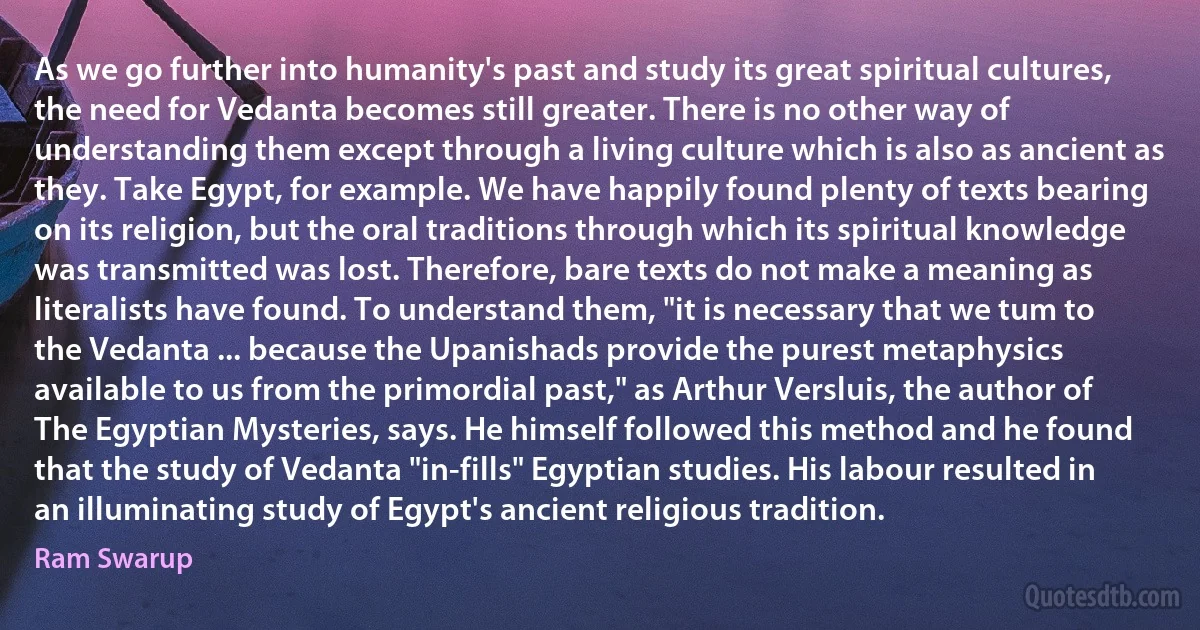
As we go further into humanity's past and study its great spiritual cultures, the need for Vedanta becomes still greater. There is no other way of understanding them except through a living culture which is also as ancient as they. Take Egypt, for example. We have happily found plenty of texts bearing on its religion, but the oral traditions through which its spiritual knowledge was transmitted was lost. Therefore, bare texts do not make a meaning as literalists have found. To understand them, "it is necessary that we tum to the Vedanta ... because the Upanishads provide the purest metaphysics available to us from the primordial past," as Arthur Versluis, the author of The Egyptian Mysteries, says. He himself followed this method and he found that the study of Vedanta "in-fills" Egyptian studies. His labour resulted in an illuminating study of Egypt's ancient religious tradition.
Ram SwarupRelated topics
bare bearing egyptian example found great knowledge living lost meaning metaphysics necessary need oral past plenty primordial religion study take understanding vedanta way egypt labourRelated quotes
In a capitalist democracy there are essentially two methods by which social choices can be made: voting, typically used to make ‘political' decisions, and the market mechanism, typically used to make ‘economic' decisions. In the emerging democracies with mixed economic systems Great Britain, France, and Scandinavia, the same two modes of making social choices prevail, though more scope is given to the method of voting and to decisions based directly or indirectly on it and less to the rule of the price mechanism. Elsewhere in the world, and even in smaller social units within the democracies, the social decisions are sometimes made by single individuals or small groups and sometimes (more and more rarely in this modern world) by a widely encompassing set of traditional rules for making the social choice in any given situation, for example, a religious code.

Kenneth Arrow
It is clear that man has functioned in a multitude of states of consciousness and that different cultures have varied enormously in recognition and utilization of, and attitudes toward, ASC's. Many "primitive" peoples, for example, believe that almost every normal adult has the possibility to go into a trance state and be possessed by a god; the adult who cannot do this is a psychological cripple. How deficient Americans would seem to a person from such a culture. In many Eastern civilizations, elaborate techniques have been developed for inducing and utilizing ASC's, such as Yoga and Zen systems. In some cases vocabularies have been developed for talking about these ASC's more adequately. Fredrick Spiegelberg, the noted Indian scholar, pointed out that Sanskrit has about 20 nouns which we translate into "consciousness" or "mind" because we do not have the vocabulary to specify the different shades of meaning in these words.

Charles Tart
My broad position remains firmly libertarian, sceptical of official cover-ups and uncompromisingly internationalist, believing sovereignty to be an almost total illusion in the modern world, although both expecting and welcoming the continuance of strong differences in national traditions and behaviour. I distrust the deification of the enterprise culture. I think there are more limitations to the wisdom of the market than were dreamt of in Mrs Thatcher's philosophy. I believe that levels of taxation on the prosperous, having been too high for many years (including my own period at the Treasury), are now too low for the provision of decent public services. And I think the privatisation of near monopolies is about as irrelevant as (and sometimes worse than) were the Labour Party's proposals for further nationalisation in the 1970s and early 1980s.

Roy Jenkins
The prevailing style of management must undergo transformation. A system cannot understand itself. The transformation requires a view from outside. The aim of this chapter is to provide an outside view-a lens-that I call a system of profound knowledge. It provides a map of theory by which to understand the organizations that we work in. The first step is transformation of the individual. This transformation is discontinuous. It comes from understanding of the system of profound knowledge. The individual, transformed, will perceive new meaning to his life, to events, to numbers, to interactions between people. Once the individual understands the system of profound knowledge, he will apply its principles in every kind of relationship with other people. He will have a basis for judgment of his own decisions and for transformation of the organizations that he belongs to.

W. Edwards Deming
I am presently at work on a dissertation dealing with the theory of international trade and foreign exchange rates. In dealing with this, studies of the intervention of recent years in the area of trade and exchange rates of different countries is of the greatest importance. I therefore hope to be able to begin a six month study tour to Switzerland, France and England at the end of May this year. After having collected the necessary material I intend - if the economic side can be arranged - during a stay of 6–12 months in England (probably Cambridge) or possibly the United States (in that case probably Harvard University) - to work out the above mentioned dissertation as a specimen for the doctoral degree in philosophy and pursue studies in general. I have not yet any detailed study plan. That should appropriately be set up after the arrival.

Bertil Ohlin
